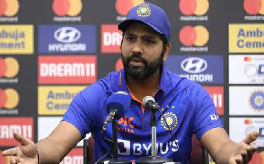In a high-stakes match that saw Sri Lanka triumph over India by 32 runs in the 2nd ODI at Colombo, the Indian cricket team once again faced the harsh reality of inconsistency. The match, filled with dramatic twists and standout performances, ended with Sri Lankan leg-spinner Jeffrey Vandersay claiming an impressive six-wicket haul, leaving the Indian side in disarray.
Indian captain Rohit Sharma did not mince words post-match, expressing his frustration over the team’s inability to maintain a consistent performance. “When you lose a game, everything hurts. It’s not just about those 10 overs (when India lost six wickets for 50 runs). You have to play consistent cricket and we failed to do that. Little disappointed but these things happen,” Sharma said during the presentation ceremony.
Sharma’s sentiments echoed the concerns of many fans and critics, highlighting the crucial middle-overs where India faltered. “We weren’t good enough. Don’t want to look too much into how we played. But there’ll be talks about our batting in the middle overs,” he added.
The Middle-Order Collapse
India’s batting collapse in the middle overs was particularly alarming. After a solid start provided by Rohit Sharma, who scored a rapid 29-ball fifty, the middle order crumbled under the pressure of Vandersay’s spin. The Indian team was bowled out for a mere 208 runs, a target that Sri Lanka comfortably defended.
Rohit Sharma emphasized the need for adaptability, especially when dealing with challenging conditions. “You got to adapt to what’s in front of you. With left-right (combination of batsmen), we felt it’ll be easier to rotate strike. But credit to Jeffrey, he got six wickets,” Sharma acknowledged.
Analyzing the Strategy
Rohit Sharma’s aggressive approach at the start was a calculated move to mitigate the challenges posed by the middle overs. “The reason I got 65 is because of the way I batted. When I am batting like that, there are a lot of risks taken. If you don’t cross the line, you always feel disappointed,” Sharma explained.
His strategy was clear: to pile on as many runs as possible during the powerplay, thereby reducing the pressure on the middle order when the conditions become more challenging. “But I don’t want to compromise on my intent. We understand the nature of this surface, it gets tough in the middle overs. You have to try to get as many as possible in the powerplay,” he added.



